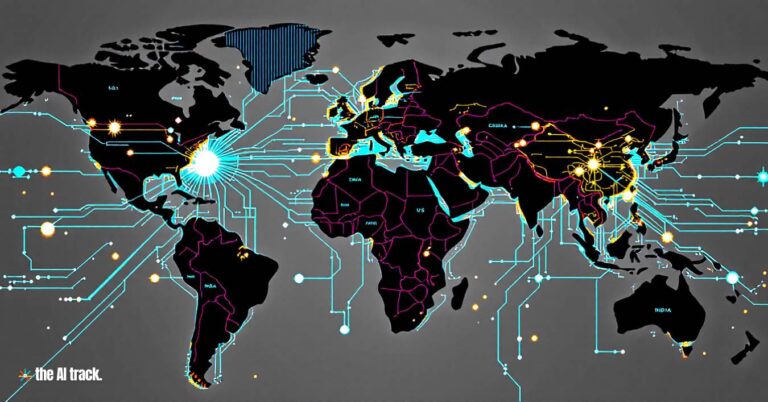The Biden administration’s new AI chip export restrictions are aimed at safeguarding U.S. leadership in the AI sector by restricting the export of advanced AI chips and models, particularly to rival nations such as China and Russia. While framed as national security measures, these restrictions have ignited significant opposition from the tech industry and international allies, who warn that the policy could stifle innovation, harm U.S. tech companies, and lead to a fragmented global AI ecosystem.

Biden’s AI Chip Export Restrictions Sparks Global Backlash – Key Points
- Overview of the New AI Chip Export Restrictions:
- Under the Interim Final Rule on AI Diffusion, the U.S. has introduced stricter AI chip export restrictions, which are essential for training sophisticated machine learning models. The regulations are primarily aimed at preventing adversarial nations from gaining access to U.S. technology that could enhance their military and cybersecurity capabilities.
- The new export framework divides countries into three categories:
- Group 1 (Unrestricted Access): U.S. allies, including Japan, the UK, Australia, Canada, and most EU nations, continue to have full access to cutting-edge AI chips.
- Group 2 (Limited Access): Countries such as Mexico, Israel, and Portugal are permitted to purchase a capped quantity of AI chips annually, initially limited to 50,000 units. This access may be expanded based on their adherence to national security protocols.
- Group 3 (Restricted Access): Nations like China, Russia, and Iran face an outright ban on acquiring U.S.-manufactured AI chips and models. This is a strategic effort to limit their capabilities in AI-driven military operations and intelligence gathering.
- Divisions Within the EU:
- The European Union is split over the new restrictions. Some countries, such as France and Germany, have been exempt from certain aspects of the restrictions, while nations with perceived pro-Russian stances, such as Hungary and Poland, face stricter limitations. This division could strain future AI collaborations between the U.S. and Europe and hinder the EU’s unified stance on AI development.
- National Security Justifications:
- U.S. officials, including National Security Advisor Jake Sullivan, have highlighted that a Chinese dominance in AI could significantly shift global power dynamics, posing serious national security risks. Sullivan stressed that China could use its control over AI to challenge U.S. geopolitical interests.
- Commerce Secretary Gina Raimondo emphasized the dual nature of the policy, which aims to protect critical AI technologies while fostering innovation among trusted international partners. The U.S. seeks to maintain a dominant position in the global AI race and ensure that key AI infrastructure remains under American control.
- This initiative aligns with the broader objective of ensuring that “the world’s AI runs on American rails,” ensuring that the U.S. retains a strategic edge in the development and application of artificial intelligence technologies.
- Industry Pushback and Global Concerns:
- Leading tech companies, especially Nvidia, which commands 90% of the global AI chip market, have strongly opposed the new AI Chip Export Restrictions. Nvidia CEO Jensen Huang called the move “unprecedented and misguided,” warning that restricting access to high-performance AI chips could harm global innovation and significantly impact U.S. companies that rely on international markets.
- Nvidia’s market performance reflected immediate concerns: shares dropped by 2% after the announcement, with analysts predicting that the restrictions could limit the company’s potential for expansion in global markets, particularly in Asia and the Middle East.
- European officials, including Henna Virkkunen and Maroš Šefčovič, expressed concern that these restrictions would hinder Europe’s access to essential U.S. technology, undermining the EU’s ambitious AI development plans. The policy risks creating tension between the U.S. and its European partners, potentially complicating future AI collaborations.
- Specific Restrictions on AI Chips and Models:
- The AI chip export restrictions specifically target graphics processing units (GPUs), which are essential for training AI models. The new rules place a limit on the number of these chips exported to certain countries, capping the quantity at 50,000 units annually, with possible increases based on national security cooperation.
- AI Model Restrictions: The U.S. has also imposed controls on AI models that require 10^26 computational operations or more. These models represent some of the most powerful machine learning algorithms, and restricting access to them prevents adversarial nations from advancing their AI capabilities.
- Country-Specific Impact: Countries like China, Russia, and Iran face outright bans, while others in Southeast Asia and the Middle East, which have growing ties to Chinese tech companies, may also experience limitations in accessing U.S. AI chips.
- Global Reactions and Potential Consequences:
- The AI chip export restrictions have sparked global debate on their long-term implications for AI development. Critics argue that these rules could create a fragmented AI ecosystem, with excluded nations developing their own competing technologies, thus reducing the overall global pace of innovation.
- In China, where AI development is advancing rapidly, the move may spur efforts to build domestic alternatives to U.S.-made chips. This could undermine U.S. influence in the global AI sector and lead to retaliatory actions, escalating tensions between the U.S. and China.
- The EU is particularly vulnerable, as several member countries, including Portugal, Israel, and Switzerland, are heavily dependent on U.S. AI chips. Restricting their access to these critical technologies could damage their economic and technological competitiveness, with some countries falling behind in the global AI race.
- Economic and Innovation Risks:
- Industry stakeholders, especially those in the semiconductor and tech sectors, have expressed concerns that the export restrictions could harm the U.S. economy. Limiting access to cutting-edge AI technologies could prevent U.S. companies from expanding into important international markets, particularly in Asia and the Middle East.
- The policy could lead to the creation of a “splinternet” of AI technologies, where different regions develop competing AI systems with varying standards and capabilities. This could stunt global innovation, particularly in key industries like healthcare, defense, and transportation, delaying the development of critical AI applications.
- Smaller nations, lacking domestic AI infrastructure, could be left behind in the race for technological supremacy, reinforcing the technological dominance of larger economies.
- Political Reactions:
- Within the U.S., the Biden administration’s AI chip export restrictions have faced criticism from Republicans and certain tech advocacy groups. Senator Ted Cruz expressed concerns that the policy could undermine American technological leadership and hinder innovation.
- Nvidia’s Vice President Ned Finkle pointed out that the new regulations would introduce unnecessary bureaucratic hurdles for U.S. companies, potentially damaging their ability to compete in international markets. The regulations’ complexity and scope could lead to administrative challenges and unintended consequences, including loopholes that could undermine the policy’s effectiveness.
- Looking Ahead:
- With potential leadership changes in the future, a Trump administration may reconsider the export restrictions, potentially relaxing rules for U.S. allies while maintaining the ban on adversarial nations. However, the broader geopolitical context and ongoing concerns regarding AI’s national security implications are likely to continue influencing U.S. policy.
- The complexities of the regulations, coupled with strong global resistance, suggest that the Biden administration will need to carefully navigate diplomatic challenges to avoid alienating key allies and further fragmenting the global AI landscape.
Why This Matters:
The Biden administration’s AI chip export restrictions underscore the increasing intersection of national security and technological leadership. These regulations are not only about safeguarding U.S. dominance in the AI sector but also reflect broader geopolitical tensions, particularly with China and Russia. The policy’s implications are profound: it could drive a new global divide in AI development, potentially creating a fragmented technological landscape with competing standards. As countries like China and Russia seek to develop alternatives to U.S.-dominated technology, the U.S. will need to balance its national security objectives with maintaining strong global alliances, ensuring it does not isolate itself in the race for AI supremacy. The future of AI is likely to be marked by heightened competition, strategic partnerships, and significant geopolitical shifts.
Everything you need to know about the AI chip business and the geopolitical factors shaping the global race for AI (chip) dominance
Read a comprehensive monthly roundup of the latest AI news!







